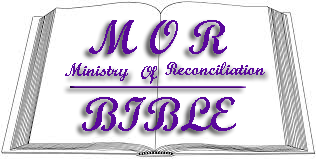|
November 2022 Printable 173 KB .pdf MOR-Bible,
which is in God the Father and the Lord Jesus Christ, peace to you
and grace, from God our Father, the Lord Jesus Christ, and us. Father,
thank for your Word which is your Will. Thank you for giving us
an understanding of your Word to the end that we know your Word
is rightly divided. Thank you, Father, for confirming your Word
when it is rightly divided and acted upon with signs, miracles,
and wonders. We pray in the name of our Lord Jesus Christ, Amen.
II Timothy 3:16 tells us:
Every
word of scripture without exception from Genesis 1:1 to Revelation
22:21 was given by God! How was God's scripture given? II Timothy
3:16 tells us it was by inspiration of God. This phrase comes
from the one Greek word, theopneustos, which means "God
breathed." The phrase "God breathed" is a figure
of speech. This is a figure of speech Anthropoatheia,
which is the ascription of human passions, actions, and attributes
to God. Figures of speech throughout the Bible are God's marking
as to what He wants emphasized. The figure of speech used here attributes
human characteristics to God which emphasizes God as the source
of His Word! See March 2019
teaching.
In
this verse, we learn the phrase For the prophecy means the
whole Word of God and it came not in old time by the will of man.
Men and women did not sit down and decide to write on their own
God's Word by their five senses of knowledge. In contrast, holy
(spiritually clean, pure, sanctified) men and women of God who believed
God, walked for God, and loved God, spoke as they were moved
by the Holy Ghost. The holy spirit moved these holy men of God
to speak and document God's Word.
In
this verse, the word revelation means to uncover or unveil.
God gave His Word to the prophets by revelation.
Ephesians
3:3:
How did Paul receive knowledge of the mystery? Ephesians 3:3 tells us by revelation; this phrase means word of knowledge, word of wisdom and discerning of spirits. To read God's Word, you must understand that holy men and women of God spoke as holy spirit (see 2 Peter 1:21) moved them just as stated above in Romans 16:25. Remember,
there are nine manifestations of the spirit documented in 1 Corinthians
12:7-10. Three of them are revelation manifestations: word of knowledge,
word of wisdom, and discerning of spirits.
The mystery of Christ in this verse is the knowledge that God is in Christ (2 Corinthians 5:19) which is Christ in you the hope of glory (see Colossians 1:27) and in whom we also are built together for habitation of God through the Spirit (see Ephesians 2:22). When
studying God's Word, there is one thing we must know first. Turn
to 2 Peter 1:20:
This
verse starts with the phrase Knowing this first. It is the
Greek word ginosko which means to know by experience. We
know by experience that the whole Word of God is not to be interpret
by one's own interpretation. We are instructed to not privately
or individually interpret God's Word. The word private is
the Greek word idios which means one's own interpretation.
The word interpretation in this verse is the Greek word epilusis
which is from the root word epilou which means a letting
loose as in dogs are let loose to hunt game. Therefore, God's Word
must interpret itself and it does.
People's
words are not perfect words unless they are by revelation from God.
This is why God's Word says what God wanted it to say; men and women
received the Word from God.
Verses
11-15 above answer the question "Why did Jesus speak in parables?"
Do we know yet what the seed was in verse 4 is? No, but we could
use our own interpretation. We could make an assumption. This would
not be rightly dividing God's Word. We would be using private interpretation
or idios epilust. However, if we can keep reading, we will
see that God's Word tells us what this seed was and what happened
to it. Matthew 13:16-17:
By
letting God's Word rightly divide what this seed was within the
verses, we learn what the Sower was, where to receive it, and what
happened to that seed. Let's continue with the chapter or context
with Matthew 13:18-23:
By
reading these verses, we get the context and can understand that
the seed of the Sower was the Word of God. When we teach God's Word
to others, we can teach the same way; we let God's Word interpret
itself in the verse and in the chapter or context.
From
these verses, do we learn what is the image of God? No, these verses
do not tell us what God's image is. And if we were to read the rest
of chapter, it would not tell us what God's image is either. So,
what do we do to rightly divide God's Word and not use our private
interpretation? We must search the scriptures for what God's image
is.
Now
we see from God's Word that He is Spirit; the image of God is Spirit.
See March 2016 teaching.
God has no body and no soul; He is only Spirit.
God's
Word tell us that man was formed from the dust of the ground.
God then breathed into his nostrils the breath of life; and man
became a living soul. (This is breath of life. See February
2016 teaching) When did man become a living soul? When he received
the breath of life from God! Before the breath of life,
man was not a living soul according to God's Word!
Go
back to our example of Genesis 1:27 and the way in which we reviewed
scripture to understand what God's image is. We turned to John 4:24
and were able to rightly divide God's Word to learn God is Spirit.
Then 1 Thessalonians 5:23 told us that we have spirit, soul, and
body once we confess Romans 10:9. This is the way we use God's Word
to interpret itself and not rely on idios epilust.
When
studying His Word, the first thing we must know is written in 2
Peter 1:20:
We learned the Word of God was received by revelation or word of knowledge, word of wisdom, and discerning of spirits by holy men and women of God who spoke as the holy spirit moved them (see 2 Peter 1:21). We learned the mystery of Christ is that God is in Christ in you (2 Corinthians 5:19), the hope of glory (Colossians 1:27), and the habitation of God through the spirit (Ephesians 2:22). We then read some examples in God's Word to see how God's Word interprets itself in the verse, chapter or context, and/or how it is used elsewhere in God's Word. Based on this understanding, we can teach God's Word to others and be accurate in the interpretation of God's Word. We can let God's Word interpret itself in the verse, chapter or context, and/or how it is used elsewhere in God's Word. We can know II Timothy 3:16 instructs us that:
Father,
thank you for interpreting your Word for us so we can understand
your Word and put it into practical application in our lives. Father,
when your Word interprets itself, we all speak the same thing, there
are no divisions among us, and we are perfectly joined together
in the same mind and in the same judgment (1 Corinthians 1:10).
For your Word, Father, is quick, and powerful, and sharper than
any two-edged sword, piercing even to the dividing asunder of soul
and spirit, and of the joints and marrow, and is a discerner of
the thoughts and intents of our hearts (Hebrews 4:12). In the name
of the Lord Jesus Christ, Amen. In
the Lord, |
|
© 2016-2024 MOR-BIBLE contactus@mor-bible.com

